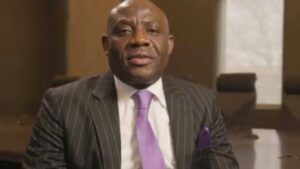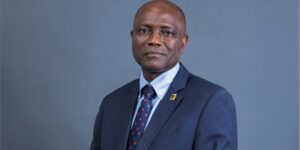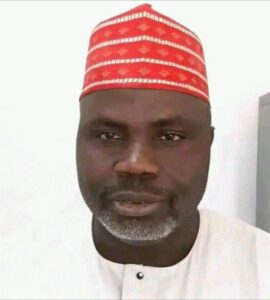2023: If elected, I will build on Badaru’s legacies — Jigawa Deputy Governor, Danmodi
The Jigawa State Deputy Governor, Alhaji Umar Namadi Danmodi, is the ruling party, All Progressives Congress (APC) candidate for the 2023 governorship election in the State. He said if elected in 2023, he will continue from where Governor Badaru stops. In an exclusive interview with Umar Akilu Majeri, the gubernatorial candidate also denied the rumor going on in the State that he is securing a loan of N2 billion to finance his political campaign. He said it is a blatant lie which has no roots.
This title Danmodi how did it originate?
The word “Danmodi” is derived from the word Namadi. Also, the name has pair ancestors because our grandfather’s name was Mamuda and people addressed him as “Danmoda” which means the son of Mamuda. That’s the reason why people also addressed me as Danmodi.
As a seasoned politician and also a bussiness mogul, now Governorship candidate, how did you find it?
Politics is very interesting. People are keen asking me how did I manage public sector? I always disagree with perception. Private and public sectors are the same, the pattern of the work is the same. It’s only the efficiency that matters a lot. The difference may be in the human resources of the private sector with more workers which have been checked-up for efficiency, having been placed on demands to produce results based on profit making or achieving a target: while in the public sector that is not available. In a public setting, a worker will be given an office to what he will do, hardly can you find somebody tasking him or assessing him on what he/she had achieved in the target. So, actually when I found myself in the public sector I feel normal. I can see no difference because I have a training and background of efficiency and effort to achieve the target. That is why when I was the commissioner of finance, I worked differently. They realised that I work differently, even though not actually different but the patience, and approach, effectiveness or the efficiency is different. In a private setting, you are tasked to achieve result under effective and constant supervision. Also in the private sector, your advancement is based on how you achieve result, while in the public sector one is being assessed in every three years for promotion.
Money politics has become a phenomenon, and many have a belief that, if one has no money he could harldy win an election, are you satisfied with such opinion?
It is not true. I have no money and I’m running for the office of a governor and I’m hopeful I will win the election by the God’s grace. I have no money.
Is it true you are been pressurised by your supporters to obtain a bank loan to the tune of N2 billion to fulfill your political ambition?
I have just heard it for the first time from you. I don’t know anything like that. Which bank will give you loan to finance election? I’m a financial expert, no reasonable bank would give anybody a loan to finance election. No bank can do that. This is not true, I’m just hearing this for the first time.
What is your political strategy to achieve your objectives?
The strategy is simple. When you have the confidence of the people, when people believe in you that you will do right do justice and be fair to them; when people believe you know their problems and you are going to deal with their problems squarely. That is what is important and is the best strategy.
It is part of Jigawa political challenge, the issue of “emiratism,” what is your plan to tackle such problem in the State?
I don’t need to convince anybody. If you are part and parcel of Jigawa state, one of the issue people believe is justice in terms of my performance as a commissioner of finance. And as far as I’m concerned, since I have been working in the system I have never felt I’m from one part of the state or zone. All I know is I see myself as an indigene of Jigawa state and I see each and every one as part of Jigawa state. I was a commissioner of finance in Jigawa state, still in my position as deputy governor, I see myself as deputy governor of Jigawa state, not for any part, or section. No I’m not. I don’t believe in that and it has not been my issue. And I don’t think that will work for anybody because Jigawa is our own State, we don’t expect anybody from any where to come and build our State and it is our duty to develop the State. And if we want to work hard, we have to put our head together, we have to keep all sentiments aside and take ourselves as one; everyone is a stakeholder, and if all of us are stakeholders, looking for where you came from is not important.
The issue of Fulani/Farmers clash which claim lives annually in Guri area and other places in the state, if elected what action will you take?
Even now, before I’m to be elected, we are doing something and it is working perfectly. We are able to reduce the issue to a bearest minimum. You see, Fulani issues require a lot of strategies. Fulani and farmers are the same. They are all indigenes of Jigawa state; you must see them as such, and treat them as such, and each must be given their rights and privileges. Everyone must have a feeling of belonging, that he is part and parcel of Jigawa State. That is exactly what this administration is doing. The Fulani’s business is rearing animals – they need grazing reserves and watering points, we provided all, while farmers needs is fertilizer and other farming implements, we have also given them. We are doing our best and we will continue to do more and more.
But for now, what is your major challenge as deputy governor?
Many challenges deputy governors do have is as a result of their failure to understand each one’s responsibilities. First of all, one has to understand the role of his office in order not to be caught in a state of a turmoil which in various occasions lead to many problems and challenges. As a deputy governor, you have to understand who you are. Your role is to deputise the responsibilities of the executive governor. Your function is based on what the governor asks you to do. And once you understand your job, you’ll do your work very well. I am happy with my job as a deputy governor because I have been assigned with a lot of responsibilities by the executive governor and I discharge them diligently. I am very delighted to be a deputy governor and if I will have any other opportunity to work with his excellency, Alh. Muhammad Badaru Abubakar as his deputy, I will be glad to do it.
If elected as the governor of Jigawa state in 2023, which is your favourite policy of Badaru Adminstration to build upon?
This administration has virtually surfaced projects in all the nooks and crannies of Jigawa state. Impact, it’s the only administration in the history of Jigawa state that initiate “one village, one project.” These projects have touched people’s lives and contribute toward the development of rural and urban areas in the state. In today’s Jigawa, you can hardly find any village or community that has not benefitted from projects in this administration. The policy of this administration is a developmental policy, which is continuous in nature. All the policies are ones that have been developed by us, and we’ll continue with them if elected in 2023, God willing.
How would you describe your Boss, Governor Badaru Abubakar?
Governor Muhammad Abubakar Badaru is a very nice and intelligent person. In fact, he is the best to the core who has been maintaining a harmonious atmosphere of working relations with all his proteges. In addition, Governor Muhammad Badaru is very hardworking, a goal-getter, and an achiever. If I will have an opportunity to work with him, I would not mind.
Would you continue with the calculator policy of Governor Muhammad Badaru Abubakar if elected as Jigawa State Governor in 2023?
Definitely, calculator will be re-adopted as a prime factor of good governance to achieve financial prudence and check mate excessive as well as financial recklessness for the common good of the people. The calculator, is not saying Jigawa, as a predominant civil servant state should not spend money, the calculator is telling you to utilise the money and spend it judiciously according to the tenet of the law. The calculator is telling you to use the money and get value for that money, don’t waste the money, that’s what the calculator is saying.
What new thing would you introduce to improve the State in terms of revenue generation, considering the state’s source of incomes and economic status?
Revenue generation is very important, but like what my boss (Gov Badaru) always says, ‘revenue can not be generated in a weak economy.’ You can’t do that. But what the present administration is doing is building the economy through agriculture, we will continue with that policy to build the economy. At least, we are lucky that he (Gov. Badaru) has done something. He has started building the economy and the economy is becoming strong enough to observe the shock of revenue collection. So, with that we will continue to build the economy on that; once that is done, we will take the advantage of that economic realities. We will take advantage of that to boost internally revenue generation. It is very obvious to do that. Thank God Almighty, the economy is taking shape now. The GDP when we came-in was about N900 billion. But as at last count, the GDP in the state is about N2.3 trillion. So, that shows the growth of the economy, that means we will reap from the administration of Alhaji Muhammadu Badaru Abubakar. So, we will be able leverage that to boost our internal revenue.
How do you view the challenge of the Muslim/Muslim ticket of the APC? What are the chances of your party?
Well, you see, the Muslim/Muslim ticket, the way people are seeing it is different from the actual situation.




